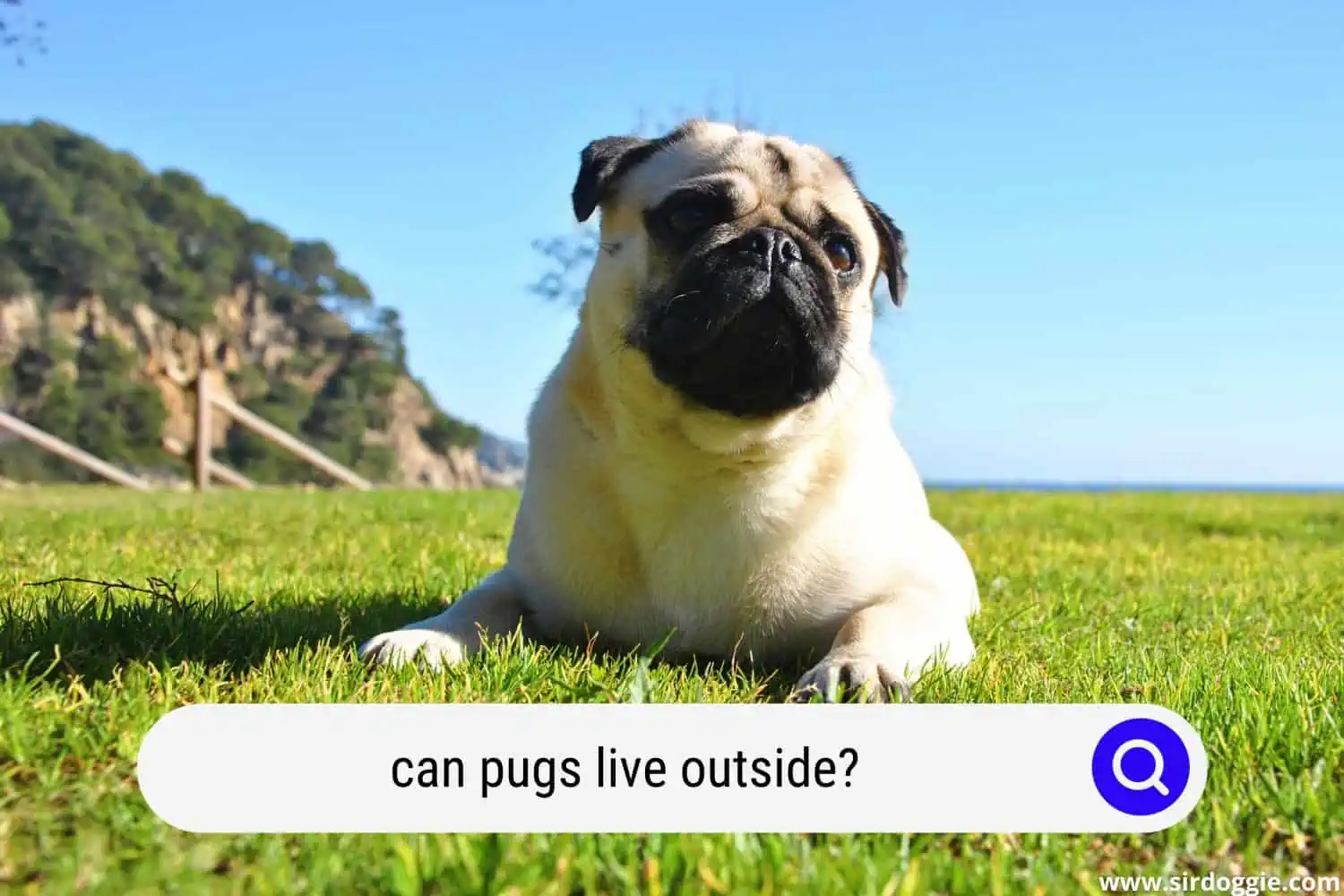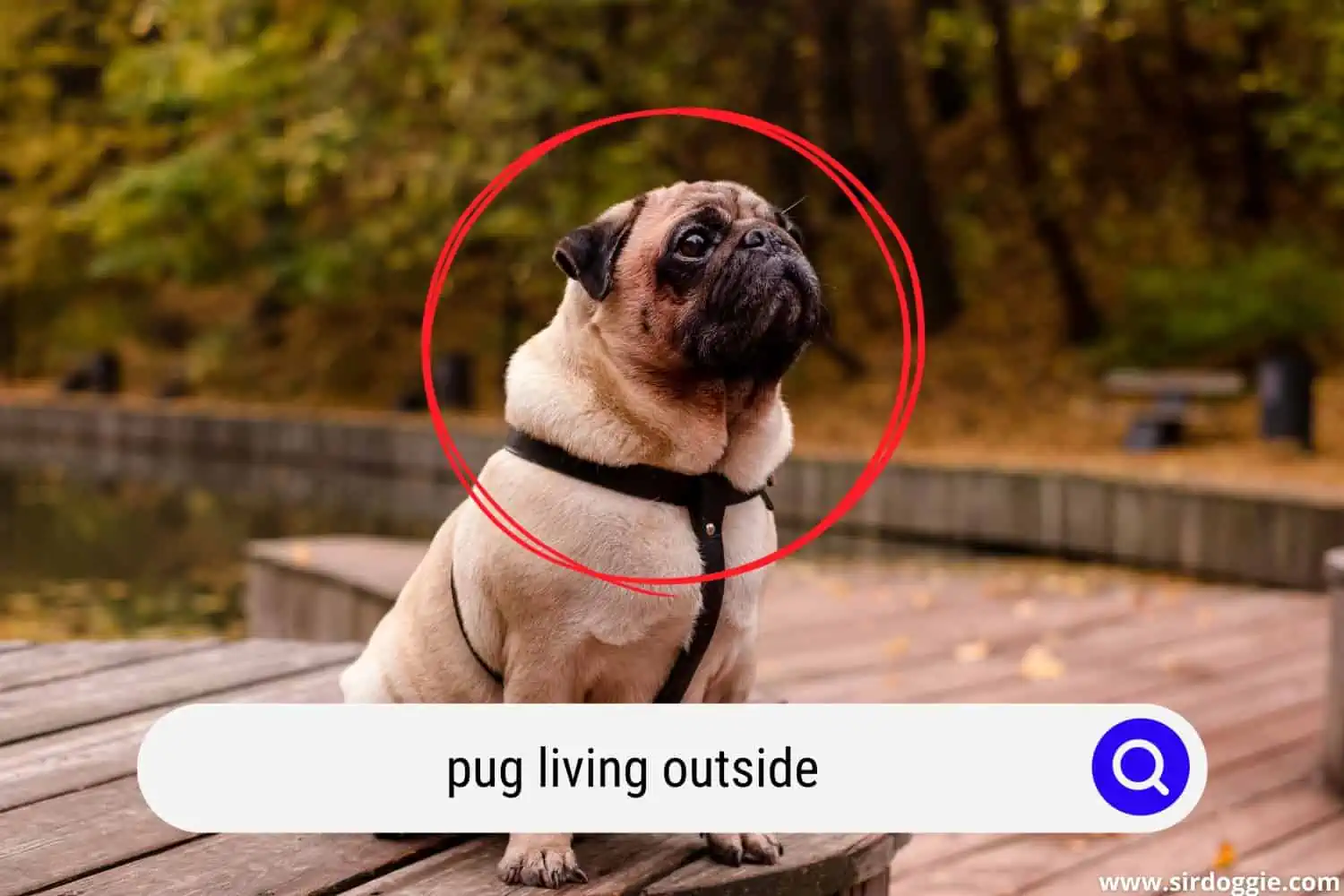Can Pugs Live Outside?
Pugs are overly sensitive to weather and extremes of heat and cold, so on the question can pug’s live outside? The answer is no. Because of their adorable squished face, this brachycephalic breed is prone to respiratory difficulties.
They have a hard time breathing in hot weather and might succumb to heat exhaustion. That is why keeping your Pug outside might be risky.

Can You Leave Your Pug Outside?
People never consider Pugs as outside dogs. You should keep an eye on their time outside and try not to let them out in the sun for more than 10-15 minutes at a time. Pugs are known for resting on the patio and appearing to be enjoying the sun. You can’t let this trick you.
Can Pugs Sleep Outside?
Now, if you leave your Pug outside for 15 minutes in temps about 80 degrees and appears to be alright, you might be tempted to let him out a little longer, but don’t! Heatstroke may strike quickly, in a matter of seconds, and it can be fatal to your Pug.
Are Pugs Outside Dogs?
Pugs have narrower respiratory airways due to their pushed-in faces. They may have a hard time adapting to severe extremes, such as heat or cold. Pugs are feeble, especially when it’s too hot outside.
Even if they get along well with youngsters, they may scare them. Pugs have big, projecting eyes that are easily scratched. That is a breed that is constantly looking for affection and careful treatment.
Related Reading: Do Pugs Like To Swim?
Can Pugs Live Outside & Why Is Dangerous?
We’ll explain why it’s not a good idea to leave your pug outside on its own. You should be aware of how a circumstance like this might affect your pug as a dog parent.
When it comes to designing your pug’s living circumstances, keep the following items in mind. Certain dogs thrive in outside situations, and others do not. Learn how pugs feel whether they’re indoors or outside. Continue reading if you wish to make your house the most comfortable location for your pet.
Pugs behavior
Pugs are companion dogs, and they thrive in a loving home where they feel like they are part of the family. If your Pug is left outside, it may grow anxious and exhibit undesirable behaviors such as digging, barking, weeping, and perhaps violence.
Theft
Some individuals, believe it or not, steal dogs. It may happen anywhere on the globe, even in your neighborhood. People will either resell the dog or use it to produce puppies and sell the puppies, which leads to theft.
A Pug puppy has a higher chance of being stolen than an adult Pug. Pugs are costly pets with a high resale value if sold to a new owner. Due to their human-loving disposition, pugs are also an easy target because they don’t bark at strangers as often as other breeds.
Poisoning
Malicious poisoning is uncommon, although it does occur. If you and your neighbor have a strained relationship, you may be putting your pet in danger without even realizing it. There have been reports on the Internet and social media that a neighbor poisoned a dog.
Of course, proving that your neighbor poisoned your dog will be difficult. You probably won’t notice it until your Pug becomes ill or dies abruptly one day.
Hazards
Swimming pools, backyard fences, hazardous plants, chemicals, sticks, and other outdoor risks exist. The majority of individuals have no idea whether or not their dog is in danger. If you have a pool in your backyard, be sure you take all necessary steps to save your Pug from drowning.
Can Pugs Live Outside & Where They Belong?
That is something you should learn about before getting a dog of any sort, not just pugs. Pugs are indoor dogs, so leaving them out in the open is not a good idea. There are a lot of things to think about, especially because pugs have such a unique shape.
Pugs have a hard time adapting to the outside world. Pugs have a quicker rate of heat generation and are unable to cool down. A building or automobile with air conditioning might be a nice place to take your pugs.
Do Pugs Depend On Their Owners?
Pugs are highly attached to and reliant on their owners. Pugs will strive to grab your attention at all times. If you are ready to adopt a pug, be prepared for them to want to play with you all of the time. The more care a pug requires, the younger it is.
Older pugs are more relaxed and prefer to sit someplace in the house. However, as your pug begins to demand attention, you must be there to provide it. If you want a pug, make sure you have the time for it, otherwise, you might break his poor little heart.
How To Keep Your Pug Warm While It’s Freezing Outside?
Here’s what you should do when the temperatures start to drop, as well as how to keep your Pug comfortable in the cold.
Older dogs, as well as young puppies, are significantly more susceptible to suffering in the cold. Low temperatures can hasten the onset of diseases and exacerbate an existing medical condition.
When the weather begins to cool down in preparation for winter, make an appointment with your Pug’s veterinarian for a wellness check. They’ll be able to see anything that might deteriorate as the weather grows cooler.
Don’t give too much food to your pug when it’s cold outside
During the winter, most people walk their dogs less. Most individuals are put off by the combination of colder temperatures and moisture. Of course, this means your Pug won’t receive as much activity as previously, so you may want to reduce the amount of food you provide them to minimize weight gain.
Maintain a healthy weight for your Pug. While “feeding a cold” has some merit, it’s a thin line to walk because more food keeps their energy levels up.

Related Reading: How Often Do I Feed A Pug Puppy?
Conclusion On: Can Pugs Live Outside?
You are not supposed to keep your Pug outside. Indoors, near to their human family, this toy dog breed will be happier and healthier. They are obedient canines who are simple to teach. It’s critical to do your homework before adopting a dog to ensure that it’s the suitable breed for your lifestyle.
In case you still want to walk your Pug outside after reading this, make sure you never tie them up with a leash and collar.

Family Dog Expert Author
Hi there! I’m Stuart, a devoted dog lover and family dog expert with over a decade of experience working with our furry companions. My passion for dogs drives me to share my knowledge and expertise, helping families build strong, loving bonds with their four-legged friends. When I’m not writing for SirDoggie, you’ll find me hiking, playing with my beautiful dog, or studying music.